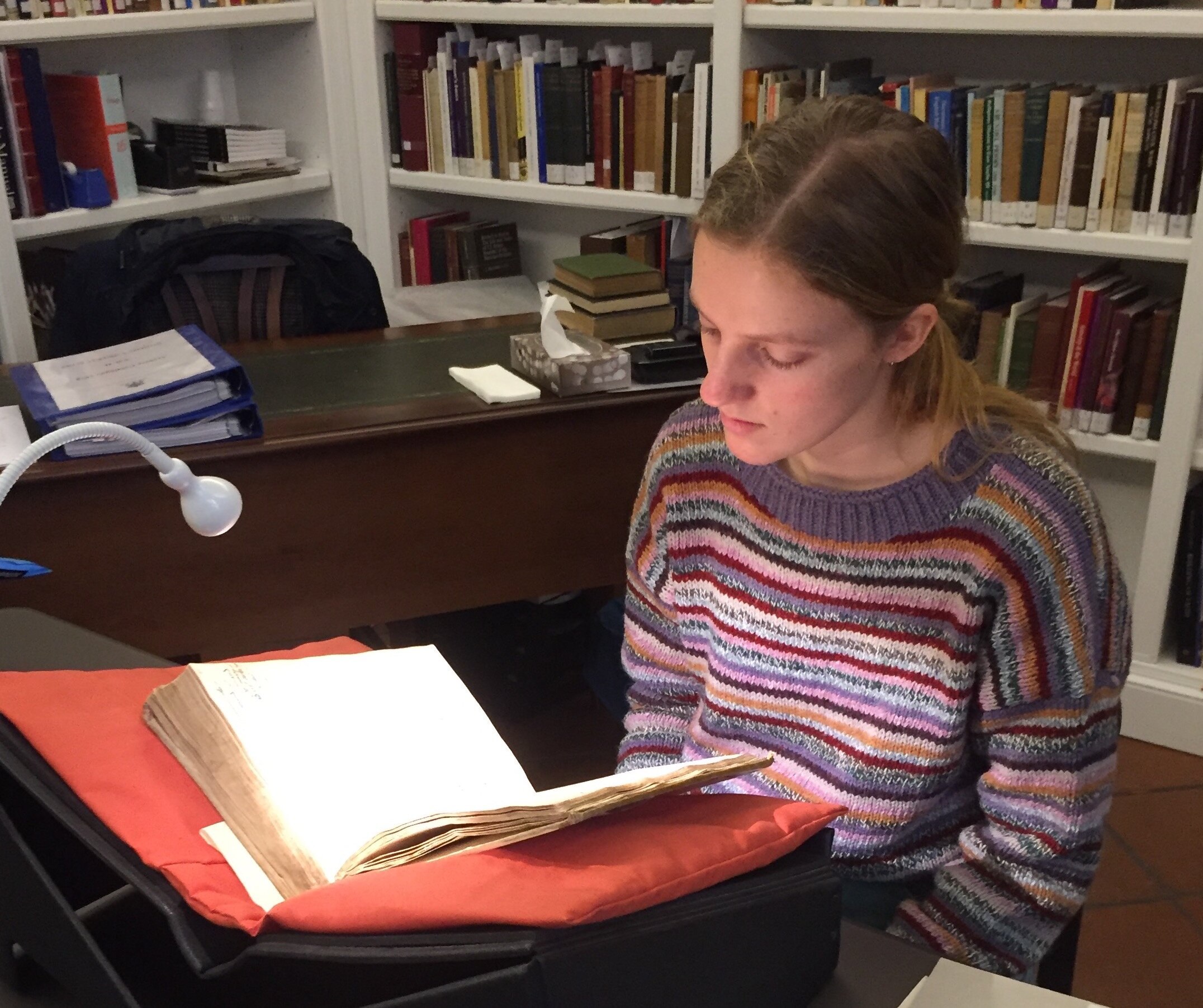Working in the Archives: reflections of a gap-year volunteer intern two years on …
In this blog, Winnie Axworthy, currently a second-year student at University College London (UCL), where she is reading for a degree in Viking and Old Norse Studies, reflects on her time as a volunteer intern in the Archives of the Venerable English College
For a few weeks during the autumn of 2018, I helped out for a number of days per week as a volunteer intern in the Venerable English College Archives. At that time, I had just finished school and was taking a gap year after having been unsuccessful in my first choice for a university place. As I had invested a great deal of energy in my first choice, and did not know what to do next, my time helping in the Archives was one in which I was trying to understand what I was really interested in, and what I wanted to do with my life.
The main things I did at the Archives were helping to check and house more efficiently the membrane – a collection of 400 medieval manuscript vellum scrolls – as well as labelling books which had just been donated to the Archives’ library collection, and sorting those books for use in the reading room, then in the initial stage of development.
Though the tasks may have been straightforward, for me the work was intriguing. As I would spend much longer than was needed organising the intriguing manuscripts, I was probably not the most efficient worker. The earliest manuscript dates from around the end of the thirteenth century – the year 1280, to be exact – and there are many from the fourteenth and fifteenth centuries.
Handling the manuscripts made me think of all the people who have held them since they were written, as well as all the people whose work went into their creation. The manuscripts give a sense of a real living link to the past. With a physical object you can imagine someone holding it as you are holding it, you can see the unique style of their handwriting, the imperfections of the ink which show their humanity. The Archives made me think of the generations of people like me, coming from England to Rome for one reason or another, and having the chance to visit the Venerable English College and the rich history it remembers. I feel privileged to have been able to experience the manuscripts so closely.
The experience showed me the value of physical objects in helping to understand history. Written sources provide detail and accuracy, but objects provide a physical connection to real people of the past -- something that is impossible to express through words. When understanding history. we have to understand the people of history, their thoughts and experiences. This is what makes history real, rather than just dates and facts from the past.
Perhaps at a more minor level, my time at the VEC Archives also taught me, or perhaps reinforced in me, the value of small communities. From the moment I arrived at the College, everyone I met made me feel welcome, especially Maurice Whitehead, the director of the heritage collections, and Sister Mary-Joseph, the librarian, but also all of the seminarians who were always friendly. The contrast of the small community of the VEC with the massive size of University College London (UCL), where I am currently studying, reminded me of school and the sense of community I enjoyed there. I have come to appreciate this due to the lack of community in a very large university setting. Places like the VEC, where everyone is mutually supported by the community, are perfect environments in which to study: you are surrounded by friends and friendly faces, rather than by strangers whom you are unlikely to see again. It makes a big difference to feel at home and relaxed in a study environment and to feel able to talk to those around you, and to take inspiration from them is an invaluable experience.
My time as a volunteer intern at the VEC Archives coincided with my applications to university and my experiences in the Archives helped me to decide to choose the Viking and Old Norse Studies course at UCL, rather than History at the University of Manchester. I decided that I did not want the conventional experience of studying history, but something more nuanced and interdisciplinary, which is what I have found at UCL. The UCL course allows me to approach history through language, literature and archaeology, which I had not had the opportunity of studying at school, and it would be difficult to find such a range of approaches in a ‘straight’ history course. I certainly did not want to be restricted by the traditional methods of studying history after my time at the VEC. So, although I’m still not sure what I want to do after university, my experience of working in the VEC Archives definitely helped me on my way to better understanding what really interests me.

